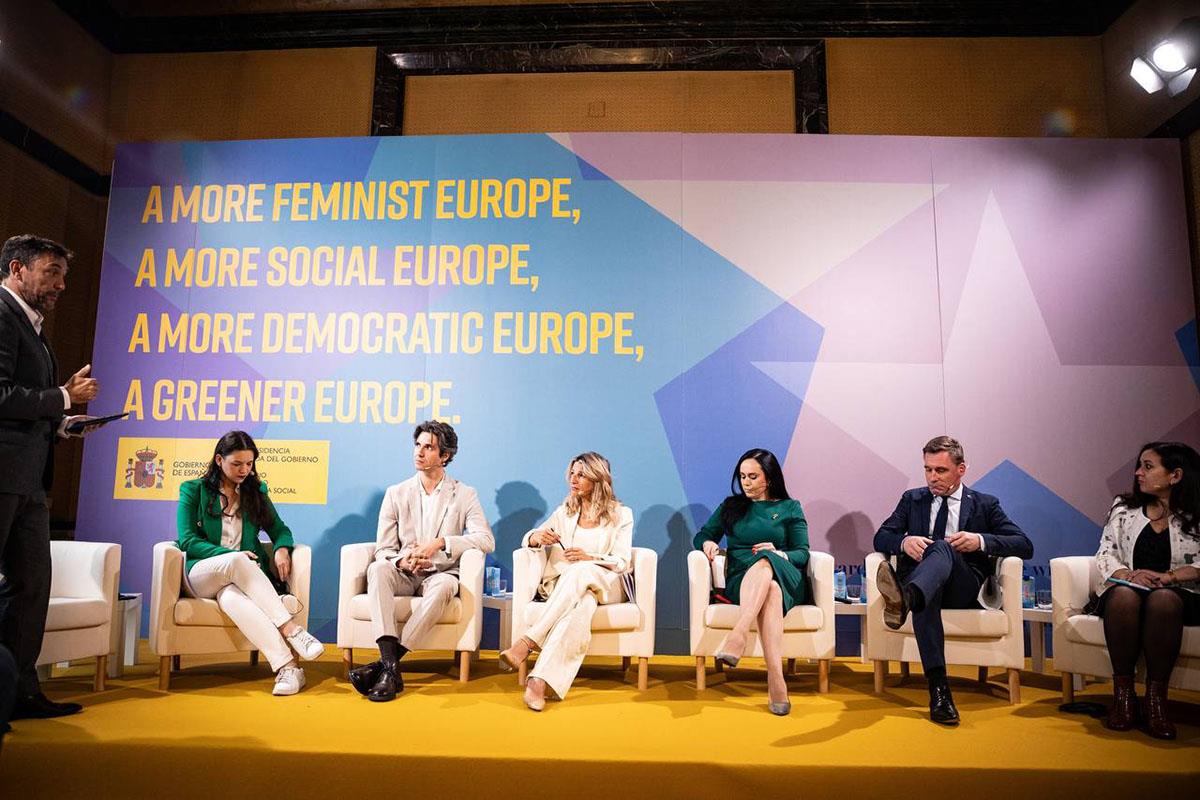On the occasion of Europe Day
Yolanda Díaz proposes a Labour Europe to make progress on rights, wages and shorter working days
News - 2024.5.9
 The Second Vice-President of the Government of Spain and Minister for Work and Social Economy, Yolanda Díaz, during the event
The Second Vice-President of the Government of Spain and Minister for Work and Social Economy, Yolanda Díaz, during the event
On the occasion of Europe Day, Díaz brought together European ministers, MEPs and experts on social and labour rights to analyse the challenges facing the European Union in a day of debates entitled Towards a Social Europe with New Rights.
Speaking to her counterparts from Slovenia, Luka Mesek, and Romania, Simona Bucura-Oprescu, the Polish Deputy Minister for Labour, Katarizyna Nowakowska, the President of the European Social Council (EESC), Oliver Röpke and Leïla Chaibi MEP, the Deputy Prime Minister explained that, following the forthcoming European elections on 9 June, a bold European social agenda must be promoted, which would reduce working hours and also distribute the benefits of automation, digitalisation and decarbonisation in the field of employment among working people.
In her view, the European authorities cannot remain oblivious to the changes taking place in society, which is why she has proposed taking concrete steps with a European legislative initiative to reduce working hours. "This proposal for a Directive must become a reality very soon, in the next European legislature. The social majorities in our countries will thank us for it," she said.
The minister explained that this initiative is already being negotiated at a dialogue table in Spain and will serve to do away with the vast differences found in Europe, with working hours ranging from 37 hours a week in Denmark to the 72 hours a week permitted in Greece.
Labour Europe
Convinced that what most strengthens the European Union, what really makes the European construction cohesive, are social policies, Díaz has advocated the creation of a Labour Europe that contributes to deepening democracy in the workplace and has defended this proposal by arguing that it will look at:
- safeguarding collective rights in order to protect freedom of association and the right to collective bargaining, which are under threat in more than one European country.
- establishing a minimum wage floor at European level in order to tackle inequalities between the 27 EU member states and thus put an end to the policies of wage devaluation that are taking place in some EU states.
- setting a common minimum threshold for labour rights, including shorter working hours, as well as new rights linked to the green and ecological transition or a democratic organisation of production systems.
The Second Vice-President insisted that the social model advocated by the European Union continues to be its best hallmark. "It is possible to build that Labour, democratic, rights-based Europe, the best place in the world to live and work".
In her opinion, work on this has already begun in the European legislature that is about to come to an end with the socio-labour advances that have been adopted.
"We are at a decisive moment in defining what Europe will be in the coming decades. We must move from words to deeds", concluded the Deputy Prime Minister.
Non official translation




